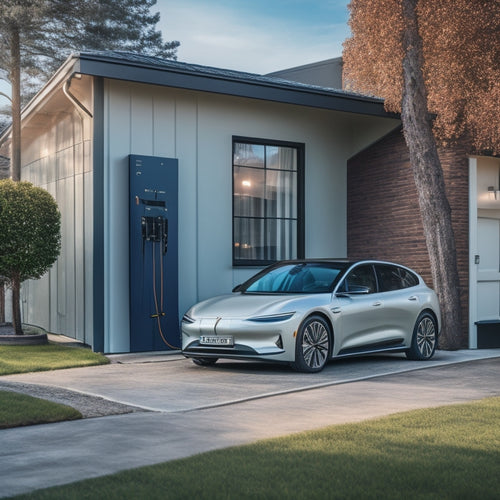
Home Solar System Kits for Off-Grid Living With Battery Backup
Share
You're likely considering a home solar system kit with battery backup for off-grid living because you want to utilize renewable energy, reduce your reliance on the grid, and enjoy the cost savings and sustainability that come with it. To achieve energy independence, you'll need a system customized to your specific needs, taking into consideration daily energy consumption, peak power requirements, and seasonal variations. A reliable system requires a well-designed solar panel array, a system charge controller, and a suitable battery backup, with considerations for efficiency, durability, and safety. As you investigate the world of off-grid living, you'll uncover the complexities of system design and optimization.
Key Takeaways
- Accurate evaluation of daily energy consumption in watt-hours (Wh) is essential for determining the right solar system kit size for off-grid living.
- A reliable energy generation and storage system with a suitable battery backup is crucial for energy independence and minimizing grid reliance.
- Proper selection and sizing of solar panels, charge controllers, and batteries ensure efficient energy production, storage, and consumption.
- Regular monitoring and maintenance of system components, including the solar panel array and charge controller, enhance overall system performance and longevity.
- Government incentives, such as tax credits and rebates, can significantly reduce the upfront cost of investing in a home solar system kit for off-grid living.
Understanding Off-Grid Living Needs
As you venture into off-grid living, understanding your energy needs becomes paramount. You're no longer tied to the grid, and your energy independence relies on your ability to generate and store power efficiently. To achieve sustainable living, you must accurately evaluate your energy requirements.
Start by calculating your daily energy consumption in watt-hours (Wh). Consider the appliances and devices you'll be using, from lights and refrigerators to laptops and medical equipment. Be certain to account for seasonal variations, as your energy needs may fluctuate throughout the year.
Next, determine your peak power requirements, measured in watts (W). This will help you choose the right solar panel array and battery bank to meet your energy demands.
A thorough understanding of your off-grid living needs will guarantee you design a home solar system kit that provides reliable, renewable energy and supports your shift to energy independence. By accurately evaluating your energy requirements, you'll be well on your way to achieving sustainable living off the grid.
Benefits of Home Solar System Kits
The shift to off-grid living can be a significant undertaking, but with a well-designed home solar system kit, you'll reap numerous benefits.
These kits provide a cost-effective way to adapt to renewable energy, reducing your reliance on the grid and minimizing your environmental impact.
By utilizing the power of the sun, you'll enjoy:
- Energy independence: Generate your own power and reduce your reliance on the grid.
- Cost savings: Lower your energy bills with free energy from the sun.
- System scalability: Easily expand your system as your energy needs grow.
- Government incentives: Take advantage of tax credits and rebates for adopting renewable energy.
- Long-term reliability: Enjoy a maintenance-free system with a long lifespan.
With DIY installation options and advancements in technology, home solar system kits have become more accessible and efficient.
Plus, they can be designed to blend seamlessly into your home's aesthetic.
Choosing the Right Battery Backup
When choosing a battery backup for your home solar system kit, you'll want to reflect on the type of battery you need, as different types offer varying levels of performance and durability.
You'll also need to think about the depth of discharge (DOD), which affects how much of the battery's capacity you can safely use.
Additionally, you should look at the charge cycle life, which determines how many times the battery can be charged and discharged before it needs to be replaced.
Battery Type Matters
Several key factors distinguish a reliable home solar system kit from a mediocre one, and battery type is chief among them. When choosing a battery backup, you'll need to evaluate the type of battery that best fits your off-grid living needs.
-
Lithium advantages: Lithium-ion batteries offer high energy density, long lifespans, and low maintenance requirements, making them an attractive option. However, they come at a higher upfront cost.
-
Lead acid comparison: Lead acid batteries, on the other hand, are more affordable but have lower energy density, shorter lifespans, and require more maintenance.
-
Battery lifespan: Assess the battery's lifespan, as it directly impacts your system's overall reliability and cost-effectiveness.
-
Cost considerations: Weigh the upfront cost against the long-term benefits, including the environmental impact of your chosen battery type.
-
Safety features: Confirm the battery you choose has built-in safety features to prevent overheating, overcharging, and other potential hazards.
Depth of Discharge
You've evaluated the pros and cons of different battery types, now it's time to contemplate how you'll use them. When it comes to choosing the right battery backup for your off-grid living, understanding depth of discharge (DOD) is essential.
DOD refers to the percentage of a battery's capacity that's used before recharging. A 50% DOD, for instance, means the battery is drained half way before recharging. This metric is significant because it directly impacts battery longevity and energy efficiency.
A lower DOD reduces wear and tear on your batteries, increasing their lifespan. Conversely, a higher DOD may provide more usable energy, but it can also lead to premature battery degradation.
When selecting a battery backup, consider your energy needs and balance them against the DOD. Ideally, you want a system that strikes a balance between energy efficiency and battery longevity.
Charge Cycle Life
In tandem with depth of discharge, charge cycle life is another critical factor to evaluate when choosing the right battery backup for your off-grid living system.
You want to guarantee that your energy storage system can withstand the rigors of repeated charging and discharging without compromising its performance or lifespan.
A charge cycle refers to the process of fully charging and discharging your battery. The number of discharge cycles a battery can handle before its capacity starts to degrade considerably affects its overall battery lifespan.
When evaluating charge cycle life, consider the following key aspects:
-
Efficiency ratings: Look for batteries with high efficiency ratings to minimize energy losses during charging and discharging cycles.
-
Maintenance practices: Proper maintenance, such as regular monitoring and balancing, can help extend the charge cycle life of your battery.
-
Environmental impact: Choose batteries with eco-friendly materials and minimal waste generation to reduce their environmental footprint.
-
Cost analysis: Calculate the total cost of ownership, including replacement costs, to guarantee your battery backup system fits within your budget.
-
Battery specifications: Check the manufacturer's specifications for the expected number of discharge cycles and battery lifespan to guarantee they meet your off-grid living needs.
Key Components of Solar Kits
You'll find two essential components in a standard home solar system kit: the solar panel array and system charge controller.
The solar panel array converts sunlight into electrical energy, while the system charge controller regulates the flow of energy to your battery bank.
These components work in tandem to guarantee your solar kit operates efficiently and safely.
Solar Panel Array
Every home solar system kit relies on a solar panel array, a critical component that converts sunlight into electrical energy.
You'll want to choose an array that meets your energy needs and fits your budget. When selecting a solar panel array, take into account the type of solar panels, their efficiency, and the overall system size.
Here are some key factors to bear in mind:
-
Solar panel efficiency: Look for high-efficiency panels (20% or higher) to maximize energy production per unit area.
-
Solar panel types: Choose from monocrystalline, polycrystalline, or thin-film panels, each with its own benefits and drawbacks.
-
System size: Calculate your energy needs and choose a system size that meets those needs, considering factors like roof size and local building codes.
-
Panel durability: make sure your panels are built to last, with a durable design and a long warranty (25 years or more).
-
Certifications and compliance: Verify that your solar panel array meets local and national certifications, such as UL and IEEE standards.
System Charge Controller
As your solar panel array generates electricity, a system charge controller plays an essential role in regulating the flow of energy to your batteries. This vital component guarantees that your batteries are charged efficiently and safely, preventing overcharging or undercharging that can reduce their lifespan.
A high-quality charge controller optimizes solar charge efficiency, allowing you to get the most out of your solar panel array.
There are several types of charge controllers to choose from, each with its own strengths and weaknesses. Pulse Width Modulation (PWM) controllers are a popular choice for their simplicity and affordability. Maximum Power Point Tracking (MPPT) controllers, on the other hand, offer higher solar charge efficiency and are ideal for larger systems.
You may also consider a smart charge controller, which provides real-time monitoring and control capabilities. When selecting a charge controller, consider factors such as your system's voltage and current requirements, as well as the type and number of batteries you're using.
Installation and Maintenance Tips
Proper installation and routine maintenance are vital to guaranteeing your home solar system kit operates at peak efficiency and lasts for its expected lifespan.
You'll want to verify that your system is installed correctly, with components securely fastened and wired correctly.
When it comes to maintenance, establishing a routine schedule is imperative. Here are some tips to get you started:
- Inspect your solar panels regularly for signs of dirt, debris, or damage, and clean them as needed to maintain peak energy output.
- Check your system's electrical connections and wiring for signs of wear or corrosion, and perform repairs as needed.
- Verify that your system's grounding and bonding are secure and meet electrical codes.
- Monitor your system's performance regularly, using data from your charge controller or inverter to identify potential issues.
- Develop a schedule for replacing components, such as batteries, that have a limited lifespan.
Sizing Your Solar System Correctly
When sizing your solar system, you'll frequently find that it's a delicate balance between meeting your energy needs and staying within budget.
To achieve the best solar energy efficiency, you'll need to take into account several factors, including your energy usage, available roof space, and local building codes. Evaluating your energy needs involves calculating your daily energy consumption in watt-hours (Wh). This will help you determine the required solar panel array size and battery capacity for your off-grid system.
It's crucial to take into account the renewable resource impact on your energy generation. Factors like shading, panel orientation, and temperature affect your system's performance.
A properly sized system guarantees you can generate enough energy to power your appliances while minimizing waste and reducing your carbon footprint. Under-sizing can lead to energy shortages, while over-sizing can result in unnecessary costs.
Top Brands for Off-Grid Systems
With your off-grid solar system sized correctly, you're ready to examine the top brands that can help you achieve energy independence.
Now it's time to investigate the best manufacturers that offer extensive off-grid solar systems with battery backup.
When it comes to product comparisons, here are the top brands for off-grid systems:
-
Schneider Electric: Known for their high-quality inverters and battery management systems, Schneider Electric offers a range of off-grid solutions that cater to different power requirements.
-
OutBack Power: OutBack Power is a popular choice among off-grid enthusiasts, offering a thorough range of inverters, charge controllers, and battery backup systems.
-
Magnum Energy: Magnum Energy is a leading manufacturer of off-grid inverters and charge controllers, providing reliable and efficient power solutions for remote homes and cabins.
-
Rolls Surrette: Rolls Surrette is a well-established brand that offers high-quality deep-cycle batteries and off-grid solar systems, ideal for remote locations and emergency power backup.
-
MidNite Solar: MidNite Solar is a US-based manufacturer that specializes in off-grid solar systems, offering a range of pre-wired systems and accessories for DIY installations.
These top brands offer reliable and efficient off-grid solar systems that can help you achieve energy independence.
Frequently Asked Questions
Can I Use a Home Solar System Kit for My RV or Mobile Home?
You can adapt a home solar system kit for your RV or mobile home, converting to RV solar, but consider factors like roof space, energy needs, and battery compatibility to guarantee a seamless, off-grid experience customized to your mobile lifestyle.
Do Solar Panels Still Generate Power During a Blackout?
As you're wondering, coincidentally, a blackout hits; you're relieved to know that solar panels still generate power, albeit at reduced solar panel efficiency, providing blackout power through your system's battery backup, ensuring your lights stay on.
Are Home Solar System Kits Compatible With Generators?
You're wondering if your solar setup can team up with a generator, right? Rest assured, you can achieve seamless solar generator compatibility through hybrid energy systems, ensuring a reliable power supply when you need it most.
Can I Install a Home Solar System Kit Myself?
Rise from the ashes like a phoenix, and take control of your energy future! You can install a home solar system kit yourself, but beware: DIY installation requires careful safety considerations to avoid electrical shock and fire hazards.
Do Home Solar System Kits Come With a Warranty?
You'll be relieved to know that most solar system kits come with an extensive warranty, typically including product and performance warranties, as well as installation support, giving you peace of mind and protection for your investment.
Conclusion
As you begin your off-grid journey, remember that your home solar system kit is the key to releasing freedom from the grid. With the right battery backup and components, you'll be utilizing the sun's energy like a pro. Your solar system will be the backbone of your off-grid lifestyle, providing power and peace of mind. So, shine bright and take control of your energy independence – the sun is waiting for you!
Related Posts
-

5 Essential Tips for Buying EV Charging Systems Online
When purchasing an EV charging system online, you'll want to make sure you're making an informed decision. First, det...
-

Top 10 DIY Conversion Kit Reviews and Tips
You're taking the first step towards electrifying your ride, and with the right DIY conversion kit, you'll be cruisin...
-

What Role Do Unicycles Play in Urban Transport?
As you navigate through congested city streets, unicycles emerge as a viable solution, slashing carbon emissions by u...


